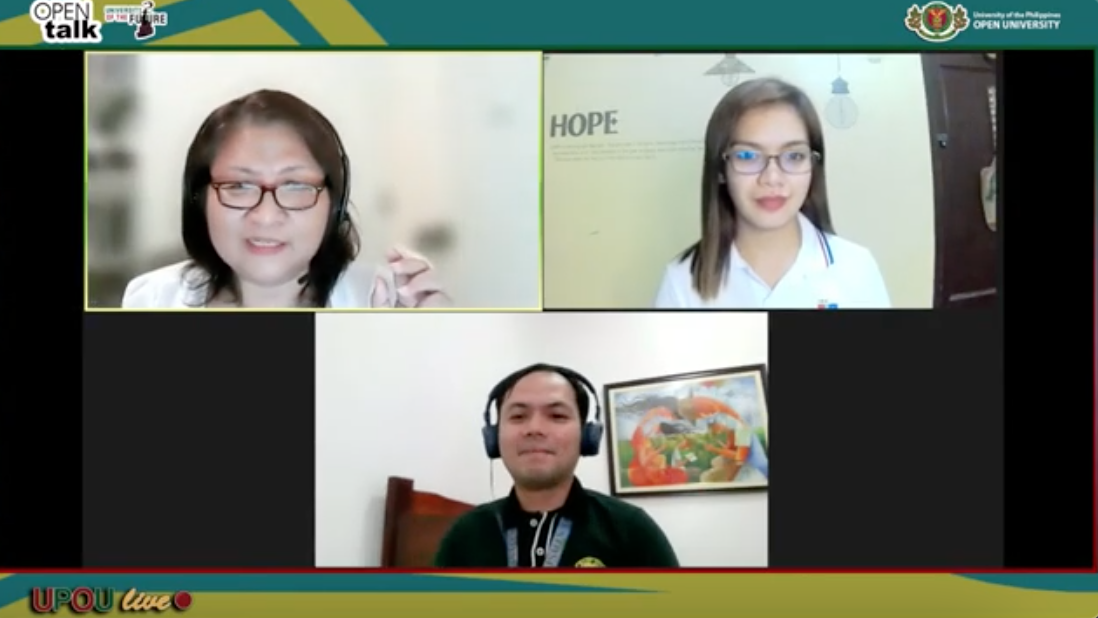The University of the Philippines Open University (UPOU) live streamed the 9th episode of its webinar series, OPEN Talk on 7 July 2021. OPEN Talk 9 highlighted the lived experiences of Alternative Learning System (ALS) Teachers and Education Program Specialists for ALS (EPSA) on how they continue to live up to their teaching roles for their respective learners during this pandemic.
The two resource persons were Mr. Rejulios M. Villenes, a Public Schools District Supervisor, and Ms. Zarah Kristine A. Flores, a District ALS Coordinator, who are both from the Department of Education (DepEd) Division of Quezon – Lopez East District. Ms. Margaret Jarmin-Suarez of the UPOU Faculty of Information and Communication Science (FICS) hosted the event, while Dr. Maria Mercedes “Ched” E. Arzadon, UP Diliman College of Education Professor, moderated the discussion.

(From upper left) Dr. Maria Mercedes “Ched” E. Arzadon, Ms. Zarah Kristine A. Flores, and Mr. Rejulios M. Villenes shared ALS experiences, best practices, and insights in Open Talk’s Episode 9.
The talk began with Mr. Villenes’ brief overview of the ALS system in the country, noting that, unbeknownst to some, it is the parallel learning system of what is commonly known as the formal educational system. As a form of non-formal education, ALS offers basic literacy, elementary, and high school to learners who for some reasons cannot attend formal schooling.
In her elaboration, Dr. Arzadon emphasized that ALS teachers have been doing flexible teaching all along and that what has been dubbed as “new normal” by their formal education counterparts is actually their “old normal.” She said that the ALS curriculum is based on functional literacy and numeracy. In fact, the Philippines’ ALS educational program received an award from the United Nations Educational, Scientific, and Cultural Organization (UNESCO) in recognition of it being the first of its kind in Asia when it started in 1999.
Dr. Arzadon asked the resource persons questions that specifically relate to the best practices of the ALS implementation in Quezon Province as well as on strategies and specific techniques used in teaching ALS. Ms. Flores talked about the importance of the survey they conducted prior to the opening of classes, which allowed ALS teachers to determine the learners’ needs when it comes to modality. Mr. Villenes enumerated a handful of challenges experienced by ALS teachers and learners, including no face-to-face opportunities for mobile teachers, the scarcity of supplies when it comes to learning materials, not to mention the suitability of such materials, so much so that there was a need to outsource.
As a concluding statement, Ms. Flores figuratively compared ALS Teachers as “flashlights” because they literally give light in times of darkness in the lives of out-of-formal-school learners who are facing many personal challenges. When asked for her wish, Ms. Flores said that since she sees ALS teachers as instrumental in providing scholastic guidance this trying time, they must be given “battery” or enough support from the service providers. In general, she also wished that the country’s ALS would get enough support from implementers so that everyone gets enough energy, which in turn becomes the very energy that is impactful to ALS learners.
To watch the recording of OPEN Talk Episode 9, visit this link or via Facebook Live.







